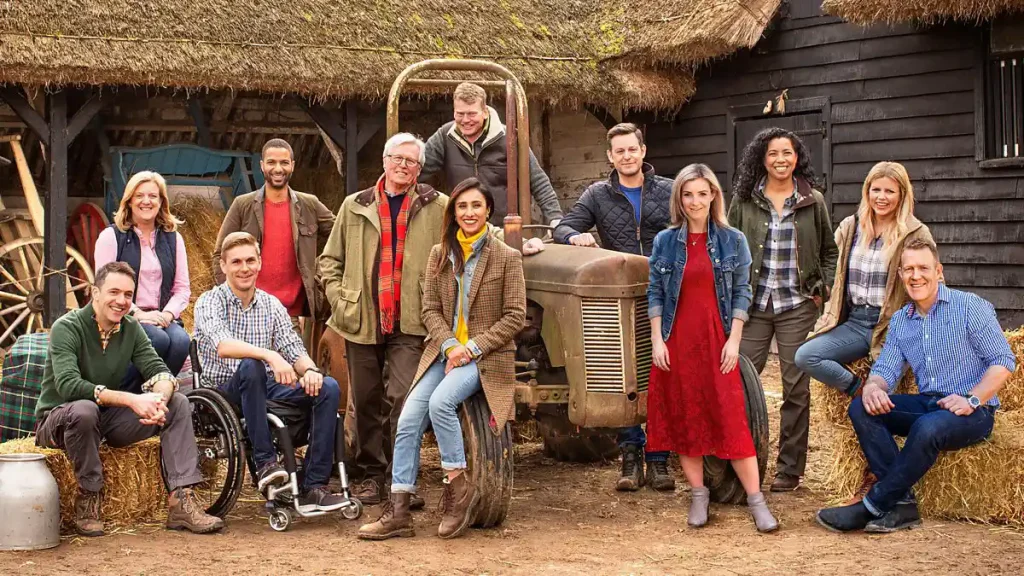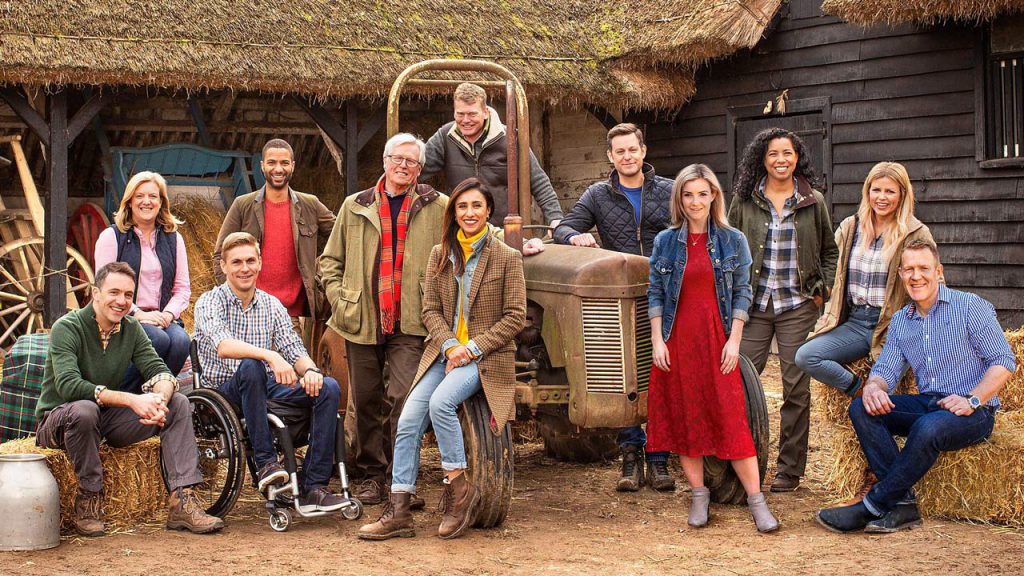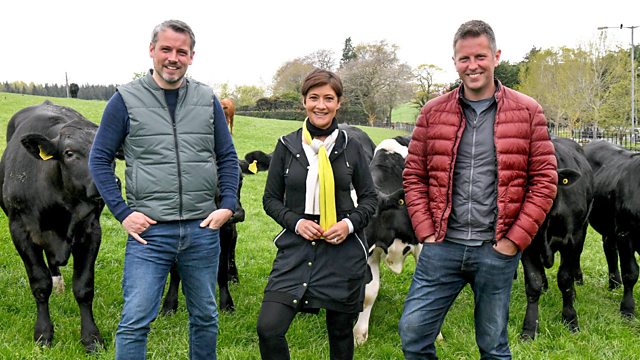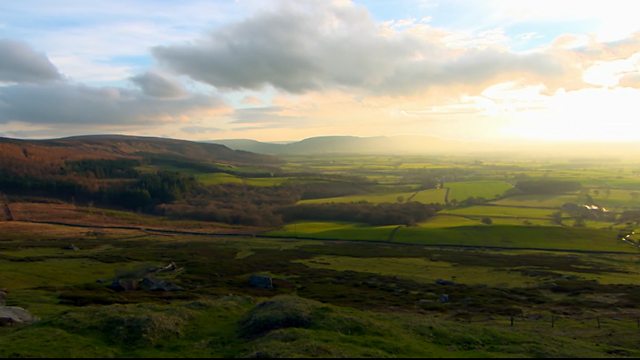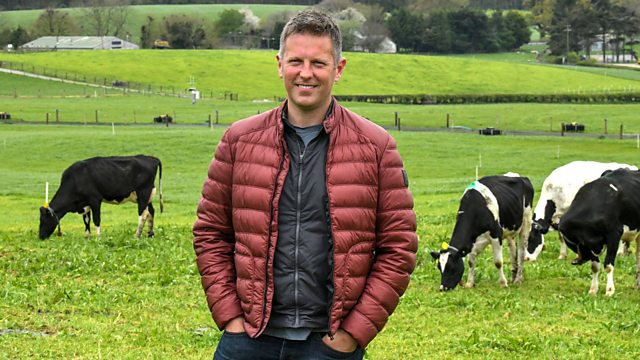Countryfile – Harvest 1 – In the first of an exclusive pair of special episodes, esteemed presenters Adam Henson and Sean Fletcher venture into the heart of Cambridgeshire. They join the dedicated Martin family on their extensive arable farm during the year’s most hectic period — the harvest season. This pivotal time holds the weight of financial stability, acting as a make-or-break point for numerous farmers, including Tom Martin. The outcome of the harvest can significantly influence the farm’s future, potentially charting a path of prosperity or hardship. As the episode unfolds, Adam embarks on a journey with Tom, exploring the vast fields that paint the landscape. Amid the golden expanses, they delve into discussions about the heightened stresses that characterize this season. The viewers are given insight into Tom’s fervent passion for pioneering regenerative farming methods, a devotion that is not only yielding crops but also bolstering the local wildlife. This approach is nurturing the ecosystem, seamlessly blending the farm’s operations with nature’s rhythm.
Venturing to another facet of the farm, Sean engages with an artisan beekeeper, Simon Croson. He is another beneficiary of the harmonious relationship between farming and nature that’s vibrantly alive on the Martins’ property. With his mobile hives in tow, Simon’s bees relish the nectar from Tom’s robust, aroma-rich buckwheat crop. This delightful interplay culminates in a honey harvest imbued with a distinct and unforgettable flavor. But the narrative doesn’t end here. The Martin family holds a heartfelt commitment to their community. Lisa Martin, Tom’s wife, spearheads a community outreach initiative, combatting the pervasive issue of rural loneliness. Within the scenic bounds of their garden, Lisa guides viewers, illuminating the crucial importance of connection and solidarity in rural settings. This garden, bathed in the glow of care and community, also plays a role in a cherished tradition. The hardworking harvesters are treated to a ‘field tea’, a rejuvenating reprieve featuring the fresh produce from the very soil they tend to.
As the episode expands its horizons, the focus shifts to young farmers Emily and Crawford. Amidst the bustle of harvest time, they are immersed in real-time learning, navigating the nuances of their chosen profession through the practical challenges and rewards of hands-on experience. Finally, adding a broader perspective, Joe Crowley embarks on an investigative segment. He delves into the burgeoning concerns clouding the UK apple industry, a vital segment teetering on the brink of collapse. This inquiry sheds light on the potential scarcity of beloved UK-grown apples, a prospect that might soon impact supermarket shelves, leaving them bereft of these cherished fruits.
This episode promises not only a glimpse into the world of farming and its intertwined relationships with nature, community, and broader industry trends but also offers a rich, multidimensional narrative that resonates far beyond the fields and orchards.
Countryfile – Harvest 1
In the first of an exclusive pair of special episodes, esteemed presenters Adam Henson and Sean Fletcher venture into the heart of Cambridgeshire. They join the dedicated Martin family on their extensive arable farm during the year’s most hectic period — the harvest season. This pivotal time holds the weight of financial stability, acting as a make-or-break point for numerous farmers, including Tom Martin. The outcome of the harvest can significantly influence the farm’s future, potentially charting a path of prosperity or hardship.
As the episode unfolds, Adam embarks on a journey with Tom, exploring the vast fields that paint the landscape. Amid the golden expanses, they delve into discussions about the heightened stresses that characterize this season. The viewers are given insight into Tom’s fervent passion for pioneering regenerative farming methods, a devotion that is not only yielding crops but also bolstering the local wildlife. This approach is nurturing the ecosystem, seamlessly blending the farm’s operations with nature’s rhythm.
An Intimate Glimpse into Harvest Season
The harvest season is undoubtedly the most pivotal and stressful time of year for arable farmers like Tom Martin. During this frantic window lasting 6-8 weeks, the tireless work of the entire year culminates, with the farmers racing against time and weather to safely gather their crops. For Tom and his family, the stakes are incredibly high, as the harvest will determine their income and livelihood for the next year. A successful harvest means the farm remains financially viable, while a poor one could be utterly devastating, potentially even spelling the end of their generations-old family farm.
As Tom explains while guiding Adam through the swaying sea of ripe barley, the unpredictability of weather adds another layer of uncertainty. Heavy rainfall can hinder harvesting equipment from entering muddy fields, while periods of drought can severely impact yields. However, Tom remains cautiously optimistic for this year’s harvest after implementing regenerative techniques to bolster the health and resilience of his soil. With Adam pitching in on the combine harvester, they begin reaping the literal fruits of Tom’s efforts, filled with hope for the harvest ahead.
The Promise of Regenerative Agriculture
Tom Martin has recently embraced regenerative agriculture, a holistic and sustainable farming philosophy aimed at improving soil health. As Sean Fletcher learns, Tom is deeply passionate about nurturing the land for future generations through these techniques. The key principles involve minimal soil disturbance, keeping the soil covered year-round, maximizing crop diversity through intercropping and crop rotation, and integrating livestock grazing.
These methods have noticeably enriched the life in Tom’s soil, increasing microbial diversity and activity. This creates a self-sustaining cycle, as the microbes boost nutrient availability for plants while the plant roots feed the microbes through root exudates. Consequently, regenerative techniques reduce reliance on synthetic fertilizers and pesticides. The Martin’s farm has already observed increased yields, drought resistance and fewer issues with pests and disease – promising signs for this harvest season.
Beyond yields, the ecological impact is also profound. Keeping the soil covered with cover crops or crop residues helps retain moisture and prevents erosion from wind and rain. Planting native flowers around fields fosters populations of pollinators and other beneficial insects. Minimal soil disturbance protects fungal networks crucial to soil structure. Overall, regenerative agriculture strengthens ecosystems and fosters biodiversity – a dramatic shift towards farming in harmony with nature.
An Artisan Beekeeper Finds Sanctuary
Sean Fletcher meets with Simon Croson, an artisan beekeeper who maintains hives on the Martin’s land through an informal partnership. As Sean discovers, the blossoming of regenerative agriculture on this farm has created an ideal environment for Simon’s honeybees to thrive. The bee colonies play an integral role within the farm ecosystem by pollinating crops. In return, they reap the benefits of plentiful and diverse forage across wildflower havens and flowering cover crops.
One essential element enabling the bees to prosper and produce the farm’s signature honey is Tom’s sprawling buckwheat crop. This hardy flowering plant thrives without chemical inputs, making it ideal for regenerative systems. Buckwheat’s small white blossoms contain abundant nectar, which translates into a dark, full-bodied honey with bold molasses notes. As Sean helps Simon extract frames glistening with buckwheat honey from the hives, the symbiotic relationship between the bees, buckwheat and regenerative practices comes to life.
Combatting Rural Loneliness
Lisa Martin, Tom’s wife, provides a window into initiatives addressing pressing issues facing rural communities like theirs. She highlights the stark reality of loneliness and isolation that pervades many farming areas today. Drawing on her own experiences, Lisa explains how few opportunities to socialize and connect with others can profoundly impact mental health. However, through volunteer work and community projects, she strives to cultivate social solidarity and ensure no one slips through the cracks.
One such initiative glimpsed in the episode is community gardening for at-risk individuals, spearheaded by Lisa. She converted unused farmland into allotment vegetable gardens open to all in need, recognizing access to fresh food and a gathering place can make a world of difference. Lisa’s compassion has brought together diverse community members to trade knowledge, tell stories and form meaningful friendships while tending the soil. Her garden is now a vibrant hub brimming with intergenerational connections, laughter and a sense of belonging –defying the specter of loneliness haunting rural areas.
The Restorative Field Tea Tradition
The episode also provides a window into a cherished farming tradition – the field tea. During harvest, the arduous work spans sunrise to sunset, leaving minimal time for breaks. However, the tea break is sacrosanct. Come rain or shine, the harvesting stops around mid-morning for a nourishing cuppa brewed right there in the fields.
Lisa explains how she prepares the field tea, with freshly baked scones involving produce plucked straight from her garden that same morning. As Sean discovers when joining the harvesters for their break, the field tea is far more than a rejuvenating reprieve – it is a celebration of community. Laughter and lively conversation flow as freely as the steaming tea. In those brief moments, the stresses of the harvest seem to dissipate into the crisp morning air.
This tradition traces back generations as a simple yet meaningful gesture of solidarity between farmers, their loved ones and the land itself. For Lisa, hosting the field tea is her way of conveying gratitude for the tireless work and unspoken kinship that sustains the harvest each year. The scene captured in this episode truly encapsulates the spirit behind this singular, restorative tradition.
Gaining Real-World Experience
The episode shifts focus to the next generation of farmers courtesy of two young apprentices, Emily and Crawford. They provide insight into the learning curve facing those embarking on agriculture as a career today. Both graduated university with farming-related degrees but lacked the tacit practical knowledge gained from hands-on work.
As Sean discovers while working alongside them, the harvest poses a trial by fire for these apprentices. They must quickly master operating costly complex machinery like combines and tractors. Mentorship from seasoned farmers like Tom proves invaluable, guiding them through the nuances of managing soil, crops, weather and equipment.
While grueling, Emily and Crawford emphasize how rewarding it is to see theory come to life. Their most vital lessons are not taught in any classroom – judging crop ripeness, maintaining machines, responding to unpredictable weather, and collaborating as a team. Their first harvest is a transformative crucible enriching their competence and confidence enormously. The experience fuels their passion to embrace agriculture long-term and uplifts the hope that the future of farming is in good hands.
Here is the second part of the 4,000 word blog article:
An Industry in Peril: The Plight of UK Apples
Shifting to a broader view, Joe Crowley investigates mounting concerns within the UK’s apple industry. As an icon of British orchards, apples hold a special place in the nation’s heart and cuisine. However, Joe discovers a sobering truth – this staple fruit has declined precipitously over the past few decades, with the country now importing almost two-thirds of its apples.
He traces the complex factors imperiling the future of UK-grown apples. Firstly, extreme weather events fueled by climate change have wreaked havoc, with untimely frosts devastating blossoms and floods and droughts ruining harvests. Labor shortages have also impacted orchards, making pruning, thinning and harvesting more onerous. Additionally, imported apples can be grown more cheaply overseas through lower regulatory standards, undercutting UK producers.
But the decline also stems from growing public demand for unblemished, picture-perfect apples available year-round. This fetishizing of flawless appearances has marginalized the rich array of quirky heirloom and cider apple varieties nurtured for generations in Britain. Instead, orchards increasingly rely on a handful of imported commercial varieties tailored for transportability, like Golden Delicious. However, these lack the complex flavors and idiosyncratic appearances treasured by apple aficionados.
Through interviews with orchardists and industry experts, Joe conveys how losing Britain’s apple heritage would represent a deep cultural loss while also ceding the nation’s food security. However, there are glimmers of hope. Many smaller orchards are responding creatively, diversifying income through cider-making, agritourism and directly supplying supermarkets and the public. Additionally, a rising artisanal apple movement champions traditional varieties, signaling restored passion for the inimitable flavors of UK-grown apples.
Persevering Through Uncertainty
Reflecting on Joe’s investigation, the precarious future of the UK’s apple industry epitomizes the uncertainty clouding British agriculture overall today. Farmers across all sectors face converging challenges, from volatile weather to rising costs of fuel, fertilizer and feed. Geopolitical factors like trade disputes and war exacerbate market instability. Combined with potential changes to agricultural policy and subsidies, farmers are navigating incredibly difficult decisions about their livelihoods.
For orchardists like David Emms interviewed by Joe, persevering despite the odds is a labour of love. Come what may, David remains fiercely devoted to his 300-year-old family orchard growing heritage cider and baking apples. The traditions and intimate connection with the land passed down through generations keep him invested in this stewardship despite shrinking profits. However, safeguarding Britain’s food sovereignty requires not just grit from individual farmers but collective efforts to make agriculture economically viable and resilient.
From the apple sector to Tom Martin’s grains, British farmers display remarkable passion for nourishing the nation with local bounty. Yet they cannot withstand intensifying pressures alone. Consumers have a powerful role in determining the future by deliberately choosing UK-grown produce, accepting seasonality, allowing imperfections and paying fair prices. Retailers also shoulder responsibility to strengthen domestic supply chains. Ultimately, policy changes are essential to provide adequate financial, training and community support. The coming years will test the innovation and solidarity of the entire British food system.
An Ethos of Resourcefulness
Delving further into the shifting realities for UK farmers, Sean Fletcher spends time with David Walston, an arable farmer from Norfolk. Despite over 40 years of experience, David emphasizes how profoundly the job has changed in recent years and the degree of adaptability now required. He remains motivated by his ethos of resourcefulness – maximizing resources and minimizing waste. This is an outlook forged by necessity from an early age.
David’s family struggled when he was young, lacking modern conveniences like mains electricity and running water. He learned the value of diligence, creativity and resilience. Whether fixing old machinery, using crop waste as feed or perfecting soil health through crop rotations, David came to treat thrift as an advantage. This mindset has equipped him to navigate adversity by spotting opportunities.
Presently, he employs an array of adaptations in response to rising fertilizer costs – planting legumes to fix nitrogen, composting any available organic matter and trialling under-sown crops. His inventive strategies highlight the importance of circular systems where the outputs of one process become resources for another. In the face of great uncertainty ahead, David’s resourceful ethos offers inspiration. His experiences reveal how constraints can spark ingenuity and that sustainability often stems from wisdom passed down through generations.
Supporting the Next Generation
A common thread across the programme is the future of farming resting upon the shoulders of youth. Thus supporting the next generation is also vital for ensuring British agriculture endures and evolves. The episode provides insight into multiple initiatives seeking to uplift young people pursuing agriculture.
For instance, Sean Fletcher meets students from Shuttleworth College, an agricultural college providing specialized courses, apprenticeships and diplomas in subjects like machinery operation, animal husbandry and horticulture. With practical modules at the college’s farm, students gain essential hands-on learning to complement academic study. This equips them with multifaceted knowledge to succeed in modern sustainable farming. Maintaining institutions like Shuttleworth is key to training young people.
Additionally, Tom Martin explains his involvement with Frontier Agriculture, a non-profit nurturing youth interest in agriculture. They provide farm-based training camps, university scholarships and mentorships. Tom volunteers as a mentor, feeling it’s his duty to share his experiences and learnings with aspiring farmers. Such programmes build passion and competency among future generations. With the average age of UK farmers over 60, attracting fresh talent is imperative. Investing in youth ensures British agriculture and rural communities thrive.
